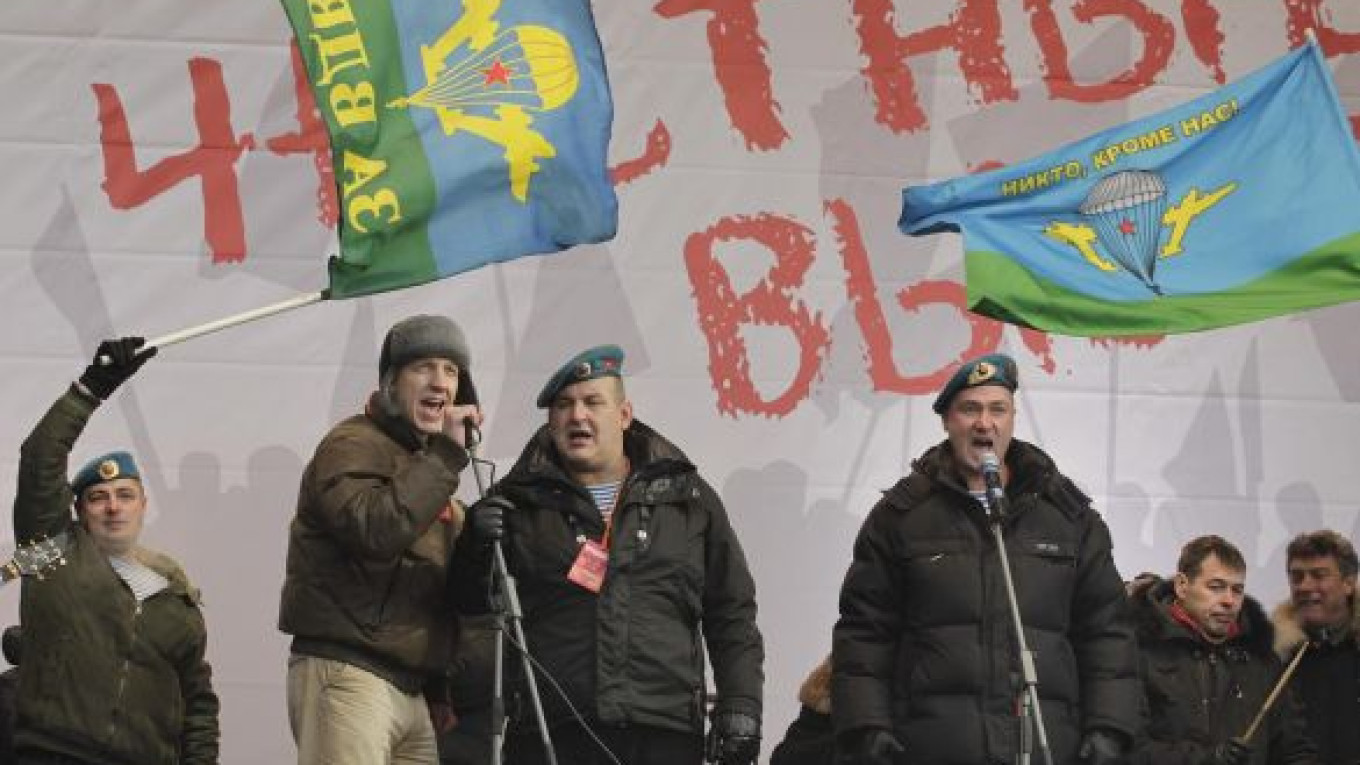MOSCOW — The most popular protest song in Moscow today comes from burly men in blue berets, unlikely heroes of a peaceful middle-class movement challenging the strongman rule of Prime Minister Vladimir Putin.
The simple but catchy song was performed at a protest rally for the first time this weekend, but many of the tens of thousands in the crowd already knew the words.
The protesters sang along with the chorus, which sums up their weariness with Putin as he intends to extend his 12 years in power in March:
"You're just like me, a man not a god. I'm just like you, a man not a sod."
The former paratroopers' song is just one of the many musical, literary and artistic creations that have inspired and enlivened a protest movement that is still largely the reserve of erudite, urban Russians.
Mikhail Vistitsky, a 45-year-old veteran of the elite force, wrote the lyrics after attending one of the first big anti-Putin demonstrations in late December.
"Mikhail had the idea that a song, an anthem, was what the whole protest movement needed," said Stanislav Baranov, who contributed music and several lines to the song. "The lyrics came straight from his heart in like half an hour."
A video of them and three others performing the song lit up the Internet, getting more than 1 million views in the first few days.
"We are not a professional band. We just expressed our discontent," said Vistitsky, who now runs a small construction business. "My guitar skills are lousy. I'd be ashamed to play the song without the boys."
During Saturday's rally, Vistitsky sang along to the music, unwilling to test his guitar playing in the subzero temperatures.
The paratroopers were joined on the stage by some of Russia's most respected cultural figures, who have played major roles in organizing the protests along with veteran politicians now in the opposition.
The artists' role in the demonstrations "is more important because they have not been discredited, while politicians have been by their former government jobs, suspected corruption and so on," said political analyst Stanislav Belkovsky. "Aesthetic forms of appealing to the protesters are more effective than political ones."
The rally's organizers and speakers also included some of Russia's best-known writers and novelists: Lyudmila Ulitskaya, Boris Akunin and Dmitry Bykov.
The paratroopers' song is not in the same artistic league, but its straightforward honesty and marching beat has won the hearts of many disgruntled Russians.
The video of the song was released in late January and produced a flood of comments, largely because of the performers' military past.
Vistitsky served in a Soviet battalion in East Germany in the mid-1980s, not far from where KGB officer Putin served around the same time.
As president and now prime minister, Putin has counted the secret services and armed forces among his loyal supporters, and the paratroopers are one of the most professional and cohesive branches of the Russian military.
The paratroopers have their own songs, but they tend to be about the Soviet military operation in Afghanistan or the separatist wars in Chechnya in the 1990s. So some military officers were not pleased to see men in the paratroopers' distinctive blue berets and striped undershirts singing a song criticizing Putin.
The chairman of the Union of Paratroopers said the song runs counter to what Russian paratroopers stand for.
Vistitsky dismissed the criticism as the Kremlin's effort to portray the protesters as part of a Western plot to weaken Russia.
"It's not offensive at all, because we're used to seeing dishonest people in power do nasty and mean things," he said.
A Message from The Moscow Times:
Dear readers,
We are facing unprecedented challenges. Russia's Prosecutor General's Office has designated The Moscow Times as an "undesirable" organization, criminalizing our work and putting our staff at risk of prosecution. This follows our earlier unjust labeling as a "foreign agent."
These actions are direct attempts to silence independent journalism in Russia. The authorities claim our work "discredits the decisions of the Russian leadership." We see things differently: we strive to provide accurate, unbiased reporting on Russia.
We, the journalists of The Moscow Times, refuse to be silenced. But to continue our work, we need your help.
Your support, no matter how small, makes a world of difference. If you can, please support us monthly starting from just $2. It's quick to set up, and every contribution makes a significant impact.
By supporting The Moscow Times, you're defending open, independent journalism in the face of repression. Thank you for standing with us.
Remind me later.


